|
|
|
Sort Order |
|
|
|
Items / Page
|
|
|
|
|
|
|
| Srl | Item |
| 1 |
ID:
183256


|
|
|
|
|
| Summary/Abstract |
Linking intelligence and policy is crucial for advancing national strategic interests. Especially important intelligence for policymakers includes key trends in national security, relevant data and probabilities of major military confrontations, such as a clash between the United States and China. It is also essential for intelligence agencies to articulate the degrees of confidence they have in their assessments. This requires them to ask themselves how reliable the available evidence is, what the range of opinion on the issue is, and what it would take for them to change their views. To better answer these questions, US intelligence agencies could consider more systematic approaches to crowdsourcing and testing their own findings.
|
|
|
|
|
|
|
|
|
|
|
|
|
|
|
|
| 2 |
ID:
156521
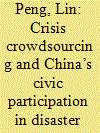

|
|
|
|
|
| Summary/Abstract |
The devastating 2008 Wenchuan earthquake unfolded the co-evolution of a proactive civic engagement and extensive application of web-based information and communication technologies (ICTs) in China’s disaster response. However, existing literature has not yet sufficiently examined how ad hoc web-based voluntary participation has led to long-term development of digital disaster management in China in the wake of the Wenchuan earthquake of 2008. The present article addresses this gap by focusing on one specific type of ICT-mediated civic effort, crisis crowdsourcing, and presenting newly collected empirical evidence from relief work in the 2008 Wenchuan, 2010 Yushu, and 2013 Lushan earthquakes. This article examines the emergence of a broad-based digitally enabled civic participation in disaster response and its more general political implications. The main findings of this study suggest that web-based ICTs have not only enabled the relatively weak and episodic social actors to overcome constraints on information, fundraising, organizational development and to achieve collective development in a field historically dominated by the state, but also facilitated the evolution of a parallel disaster management system with agenda, skills and expertise independent of the state.
|
|
|
|
|
|
|
|
|
|
|
|
|
|
|
|
| 3 |
ID:
151192


|
|
|
|
|
| Summary/Abstract |
Possibilities for crowdsourced surveillance have expanded in recent years as data uploaded to social networks can be mined, distributed, assembled, mapped, and analyzed by anyone with an uncensored internet connection. These data points are necessarily fragmented and partial, open to interpretation, and rely on algorithms for retrieval and sorting. Yet despite these limitations, they have been used to produce complex representations of space, subjects, and power relations as internet users attempt to reconstruct and investigate events while they are developing. In this article, I consider one case of crowdsourced surveillance that emerged following the detonation of two bombs at the 2013 Boston Marathon. I focus on the actions of a particular forum on reddit.com, which would exert a significant influence on the events as they unfolded. The study describes how algorithmic affordances, internet cultures, surveillance imaginaries, and visual epistemologies contributed to the structuring of thought, action, and subjectivity in the moment of the event. I use this case study as a way to examine moments of entangled political complicity and resistance, highlighting the ways in which particular surveillance practices are deployed and feed back into the event amid its unfolding.
|
|
|
|
|
|
|
|
|
|
|
|
|
|
|
|
| 4 |
ID:
175017
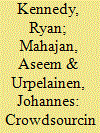

|
|
|
|
|
| Summary/Abstract |
Measuring energy access in developing countries involves much more than simply recording whether or not households are connected to the grid. Both international organizations and scholars now recognize the importance of reliable electricity supply for achieving positive development outcomes. Yet, measuring reliability is much more difficult than measuring the existence of connections. We propose an economical croudsourcing method for measuring reliability, and compare this method to energy monitor data for 122 households over 12 months. The results suggest that, while far from perfect, crowdsourcing provides a reasonably accurate method for monitoring the reliability of access over time, especially when modeled as a non-linear relationship. We apply these findings to model energy reliability in a broader group of villages across Uttar Pradesh, India, demonstrating the existence of disparities between urban and rural reliability and seasonal fluctuations in reliability. The system laid out in this study can be utilized by government and non-government organizations to quickly and cheaply monitor energy reliability.
|
|
|
|
|
|
|
|
|
|
|
|
|
|
|
|
| 5 |
ID:
110287
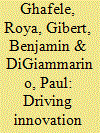

|
|
|
|
|
| Publication |
2011.
|
| Summary/Abstract |
Worldwide filing of patent applications and the ensuing invalidation requests have seen staggering growth over the last decade. The result is increasing patent backlog, deteriorating patent quality and an uncertain economic environment. Patent application review is an integral part of the examination procedures undertaken by patent offices before a patent grant is given. Prior art search is a complex and time consuming part of this process. Crowdsourcing this critical stage is a valuable opportunity to render the patent application review process more efficient. This paper describes the crowdsourcing phenomenon and details how it can aid patent review. The open source review pilot projects of the USPTO and JPO are presented in order to assess the potential of opening prior art search to the wider community of experts and practitioners. Public-private partnerships between patent offices and companies managing online review communities are proposed as a valuable opportunity to leverage the benefits of open review while providing sufficient incentives and quality assurances to yield useful contributions.
|
|
|
|
|
|
|
|
|
|
|
|
|
|
|
|
| 6 |
ID:
146107


|
|
|
|
|
| Summary/Abstract |
Crowdsourcing platforms offer a source of inexpensive data for research. At their fingertips, researchers have a round-the-clock workforce to fill out surveys, participate in experiments, and content-analyze text, among other tasks that generate social science data and help support research. Thanks to its low cost and convenience, crowdlabor has quickly and uncritically become a mainstream tool in our discipline. While such platforms have been evaluated on their aptness to generate high-quality data, surprisingly little has been said about the economic or political implications of their usage. Among other aspects, this article problematizes the “state of legal exception” in which crowdlabor markets operate, their tendency to rely on a pool of economically vulnerable workers and the asymmetrical employment relations they create. Rather than offer an easy solution, I aim to open up a conversation about this unique set of challenges in order to acknowledge and address them.
|
|
|
|
|
|
|
|
|
|
|
|
|
|
|
|
| 7 |
ID:
142585
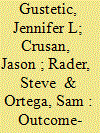

|
|
|
|
|
| Summary/Abstract |
In an increasingly connected and networked world, the National Aeronautics and Space Administration (NASA) recognizes the value of the public as a strategic partner in addressing some of our most pressing challenges. The agency is working to more effectively harness the expertise, ingenuity, and creativity of individual members of the public by enabling, accelerating, and scaling the use of open innovation approaches including prizes, challenges, and crowdsourcing. As NASA's use of open innovation tools to solve a variety of types of problems and advance of number of outcomes continues to grow, challenge design is also becoming more sophisticated as our expertise and capacity (personnel, platforms, and partners) grows and develops. NASA has recently pivoted from talking about the benefits of challenge-driven approaches, to the outcomes these types of activities yield. Challenge design should be informed by desired outcomes that align with NASA's mission. This paper provides several case studies of NASA open innovation activities and maps the outcomes of those activities to a successful set of outcomes that challenges can help drive alongside traditional tools such as contracts, grants and partnerships.
|
|
|
|
|
|
|
|
|
|
|
|
|
|
|
|
| 8 |
ID:
192429


|
|
|
|
|
| Summary/Abstract |
AMID the crisis of the international order, there is a tendency for the properties of digital diplomacy (DD) to change. Warning messages, instead of mere statements and reports, appear in the information field with increasing frequency. This is especially clearly manifested in connection with the Ukraine conflict in the absence of dialogue (Russia-US, Russia-Ukraine, Russia-West) and diplomatic relations (Ukraine-Russia). DD is increasingly playing a proactive rather than reactive role, taking the place of, for example, negotiating platforms.
|
|
|
|
|
|
|
|
|
|
|
|
|
|
|
|
| 9 |
ID:
141378


|
|
|
| 10 |
ID:
172649
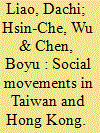

|
|
|
|
|
| Summary/Abstract |
We propose the logic of communitive action to analyze digitally networked social movements. Through an examination of Taiwan’s Sunflower Movement and Hong Kong’s Umbrella Movement, we offer an explanatory framework of community consciousness that elucidates a new type of leadership, and discuss crowdsourcing as a supplement to the theory of social movements in the digital age.
|
|
|
|
|
|
|
|
|
|
|
|
|
|
|
|
| 11 |
ID:
107201
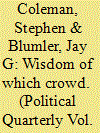

|
|
|
|
|
| Publication |
2011.
|
| Summary/Abstract |
his article considers the claims made by members of the current UK Coalition government to adopt a new style of listening, consultative politics based upon the so-called wisdom of the crowd. It considers how these claims have-and could have-been acted upon, focusing upon two central policy proposals; the funding of higher education and the reform of the National Health Service.
|
|
|
|
|
|
|
|
|
|
|
|
|
|
|
|
|
|
|
|
|